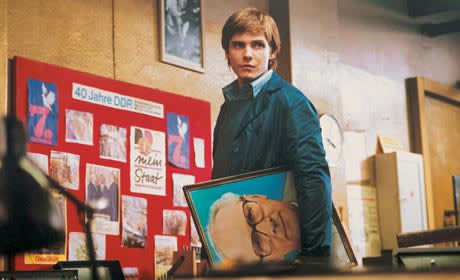After 40-plus years of Cold War despair, the fall of the Communist regimes in Eastern Europe seemed almost fantastical. When the wall came down in Berlin in 1989, Canadians were bursting with pride that the song they were singing was Ed McCurdy's "Last Night I Had the Strangest Dream." But what if you slept through that dream? On the eve of the fall of Communism, East German patriot Christiane (Katrin Sass) has a heart attack and falls into a coma. When she revives eight months later, the Berlin Wall has fallen, reunification is imminent and the socialist dream has been unceremoniously thrown out. In its place are new jobs, new things to buy and open borders. Worried that the shock will kill his mother, 21-year-old Alex (Daniel Bruhl) decides to create an elaborate lie and hide all the changes of the past year, recreating a mini-East Germany for his bedridden mother. Ugly old furniture comes out of the garbage, while the tanning beds, satellite dishes and new clothes go back into storage, but Alex's real victory is to recreate East German television programming on a closed-circuit feed from a VCR in the next room. As Christiane slowly regains her strength, the outside world begins to intrude and Alex is forced to make his make-believe world ever more elaborate. This premise is so engaging that it is easy to enjoy Good Bye, Lenin! simply as a clever comedy. This would be a shame because it is a rich and multi-layered film. On one level a convincing allegory for the workings of history, the film never loses its psychological realism and works equally well as a meditation on family Alex's father had defected to the West 11 years earlier and the reunification of the country is reflected in the equally wished for yet painful reunion of father and grown children. Above all, it is a painstakingly constructed portrait of a fascinating time. If anything, this movie is too full in the commentary, director Wolfgang Becker bemoans the 60 minutes he was forced to cut, but even so the film runs two hours. It feels crowded: there is so much back story that we don't really get going with the main plot until 30 minutes in and then a whole new development with Alex's father bogs down the conclusion. Minor characters are fully realised and interesting but distract from the main story. If recreating East Germany eight months after its fall is difficult for the characters in the film, it was even more so for the real filmmakers. The excellent featurette "Lenin Learns to Fly" details the challenges and the low-tech/high-tech solutions the filmmakers came up with from painstaking prop sourcing to complicated CG effects. The cast commentary is quite poignant, since the cast was evenly split between (former) East and West Germans, and their reminiscences from opposite sides of the Wall are fascinating. Plus: deleted scenes, "making of." (Seville)
Good Bye, Lenin!
Wolfgang Becker

BY Ingrid KeenanPublished Sep 1, 2004